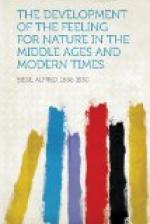True lyrist, he gave Nature her full right in his feelings, and found comfort in return; but, as Goethe said of him, gifted but unsteady as he was, ’He did not know how to restrain himself, and so his life and poetry melted away.’
Among those who made use of better material than the Silesian poets, H. Barthold Brockes stood first. Nature was his one and only subject; but in this he was not original, he was influenced by England. While France was dictating a taste like the baroque, and Germany enthusiastically adopting it (every petty prince in the land copied the gardens at Versailles, Schwetzingen more closely than the rest), a revolution which affected all Europe was brought about by England. The order of the following dates is significant: William Kent, the famous garden artist, died in 1748, James Thomson in the same year, Brockes a year earlier; and about the same time the imitations of Robinson Crusoe sprang up like mushrooms.
We have considered Shakespeare’s plays; English lyrists too of the fifteenth and sixteenth centuries shewed deep feeling for Nature, and invested scenery with their own feelings in a very delicate way.
G. Chaucer (1400) praises the nightingale s song in From the Floure and Leafe:
So
was I with the song
Thorow ravished, that till late and long
Ne wist I in what place I was ne where;
...
And at the last, I gan full well aspie
Where she sat in a fresh grene laurer
tree
On the further side, even right by me,
That gave so passing a delicious smell
According to the eglentere full well....
On
the sote grass
I sat me downe, for, as for mine entent,
The birddes song was more convenient,
And more pleasant to me by many fold
Than meat or drink or any other thing.
Thomas Wyatt (1542) says of his lady-love:
The rocks do not so cruelly
Repulse the waves continually,
As she my suit and affection
So that I am past remedy.
Robert Southwell (1595), in Love’s Servile
Lott, compares love to
April:
May never was the month for love,
For May is full of floures,
But rather Aprill, wett by kinde,
For love is full of showers....
Like winter rose and summer yce,
Her joyes are still untymelye;
Before her hope, behind remorse,
Fayre first, in fyne unseemely.
Edmund Spenser (1598) describes a garden in The Faerie Queene:
There the most daintie Paradise on ground
It selfe did offer to his sober eye,
In which all pleasures plenteously abownd,
And none does others’ happinesse
envye;
The painted flowres, the trees upshooting
hye,
The dales for shade, the hilles for breathing
space,
The trembling groves, the christall running
by,
And, that which all fair workes doth most
aggrace,
The art which all that wrought appeared
in no place.




